-

新人教版高中英语必修3Unit 5 The Value of Money- Discovering Useful Structure教学设计
Step 3 Meaning1. 过去将来时表示从过去某一时间来看将要发生的动作或存在的状态, 常用在宾语从句中。一般由“would/should +动词原形”构成。She hoped that they would meet again someday. 她希望将来有一天他们能再见面。2. was/were going to+动词原形: 表示过去将要发生或很有可能发生的动作, 常用于口语中, 表示预言、意图或者打算等。He was going to start work the following week. 他打算下星期开始工作。3. was/were about to do: 常用来表示即将发生的动作, “刚要/正要做……”。注意该结构不与任何时间状语连用。I felt that something terrible was about to happen. 我感到某种可怕的事情即将发生。4.was/were to do: 表示“曾计划做某事”, 如果表示“本来计划做某事, 动作没实现”, 则需用 “was/were to have done”。She said she was to have told me about the accident. 她说她本来想告诉我关于事故的事。5.Start, go, come, leave, see, meet等动词的过去进行时: 表示就过去某一时刻而言即将发生的动作。She was coming later. 她随后就来。I had just put on my overcoat and was leaving to visit a friend of mine. 我刚穿上外套要去看我的一个朋友。

新人教版高中英语必修3Unit 5 The Value of Money-Listening &Speaking&Talking教学设计
4. A:We’d like to have someone to say a word at the beginning to welcome the group.B:↙Who?A:We thought that you or Dr.Johnson might do it.B用降调说Who,其意思是问,对方想让谁在开场时致欢迎词。Step 6 Pronunciation---Practice1. Listen to the short conversation and mark the intonation with ↗, ↙ or ↙, ↗. Then discuss with a partner what they intend to convey by using different intonation.Owner: You know what ?↗ It’s a million-pound bank note↙.Waiter 1: Really ?↗(question)Waiter 2: Really !↙(unbelievable and surprised)Waiter 3: Really ?!↙↗(first question then surprised)2. Listen to the conversations. Underline the parts that are stressed and mark the intonation. Then talk about the implied meanings of the responses with different intonations. Listen again and repeat.1) Henry: It’s a nice suit.Owner: Oh, it’s perfect!↙(The intonation means it is very suitable for Henry.)2) Henry: Well, that’s very kind of you.Owner: Kind, sir ?↗(what you said is not right) No, it’s kind of you. You must come whenever you want and have whatever you like. Just having you sit here is a great honour !!↙(welcome you to come again)3)Henry:Well, to be honest, I have none. Oliver:(happily) What luck!(excited) Brother↗, what luck!↙(It means “Didn’t you hear it?”)Henry: Well, it may seem lucky to you but not to me!↗(angry) If this is your idea of some kind of joke, I don’t think it’s very funny. Now if you’ll excuse me, I ought to be on my way.↙(If so, I would leave.)Roderick: Please don’t go↙...(hope Henry can wait for a moment)Part B Viewing and Talking---Describe people’s changing attitudes in a film clipStep 1 Before-listening---Tell the filmYou are going to watch part of the film The Million Pound Bank Note. Look at these photos and guess what happens in the film.

新人教版高中英语必修3Unit 5 The Value of Money-Listening &Speaking教学设计
Step 4: Listen again and decide if the following statements are true (T) or false (F).1 It was the first time Chen Liyan's story was reported. T口 F口2 Chen found 10,000 yuan in a small plastic bag in Taiyuan railway station口 F口3 Wang Zheng apologized to Chen because he couldn't offer her more money. T口 F口4 Chen took out a large loan to cure her daughter, T口 F口5 Wang set up a fundraising website for Chen's daughter after Chen told him about her situation. T口 F口Step 5:After listening, discuss the questions.1 What kind of person do you think Chen Liyan is?Chen Liyan is generous and honest because she returned a large sum of money to the owner.2 Did Chen return the money because she didn't need it?No. She returned the money because it was the right thing to do. Evidence for this is that she refused to accept the reward money because she felt that it had not been earned. 3 Is it common for people to do what Chen did?It depends on the culture. In some countries it is quite common to return money that has been found. In other countries, people believe "Finders are keepers!" 4 How did Wang Zheng feel about the return of his money?He must have been very happy and relieved to have gotten his money back. We know this because he thanked Chen repeatedly and even offered her a reward.5 Why did Ma Dongbao tell Wang about Chen's family?He must have had great sympathy for Chen and her daughter and wanted to help them.'We know this because he arranged help for them. 6 How did the news reporter feel about Chen's actions?The news reporter felt that it showed that money wasn't the most important thing in life. We know this because the reporter told us that this is what Chen believes. and then said, “that's a great attitude to take."

新人教版高中英语必修3Unit 5 The value of money-Reading and Thinking教学设计二
? Could you offer me some kind of work here?? I don’t want your charity, I just want an honest job.? Careless: I landed in Britain by accident.Step 7:Consolidation.? Find Henry? Roderick and Oliver were I .making a bet when they saw Henry, a poor young man. ? Know Henry? About a month ago, Henry was sailing and later he found himself carried out to sea by a strong wind. Fortunately, he 2.was spotted by a ship. And it was the ship that brought him to 3.England? Offer money to Henry ? Oliver and Roderick gave Henry a letter and told him that there was money in it. They 4.persuaded him to accept it, and made him 5.promise that it wouldn't be opened until 2 o'clock.Step 8:Language pointsa large amount of: a large quantity of; a great deal ofe.g. They bought a large amount of furniture before they moved their new house.make a bet: make an arrangement to risk money, etc. on an event of which the result is doubtful.e.g. We made a bet on the result of the match.permit sb to do something: allow somebody to do somethinge.g. My mother doesn’t permit me to ride in the street after it rained.by accident: as a result of chancee.g. I only found it by accident.stare at: look at somebody or something with the eyes wide open in a fixed gaze( in astonishment, wonder, fear, etc)to be honest: to tell you the truth; to be franke.g. To be honest, I don’t think we have a chance of winning.Step7 Homework:What do you think will happen to Henry? Will the bank-note help him or get him into trouble?

新人教版高中英语必修3Unit 5 The Value of Money-Reading and Thinking教学设计一
Everybody wants to get wealth.In today’s material world,making money or becoming wealthy symbolizes a person’s success and capability. Many people just make every effort, pay any price to attain greater wealth. With money,they can buy nice, large apartments in nice neighborhood. With money they can own luxurious cars. Wealth seems to bring all happiness in life.But is wealth the only road to happiness? Not really. There are many things in the world, which are beyond the means of money, such as friendship, love, health and knowledge. People are so preoccupied with struggling for money that they have no time or would not take the time to form or maintain friendship. What happiness can they feel living as lonely miserable creatures without love or friends in the world even if they accumulate tremendous wealth?In my opinion, people can’t do anything without money, but money is not everything. What money will bring you depends on your personal belief and goal in life. If you are kind enough to help others, especially the poor, money is a good thing to you. With it, you can do much more for the benefit of people and your country, and it will add to your own happiness. If you want money just for your own needs, you’ll never be satisfied or happy. In a word,you should have money spent for more people. Only then can money be the source of your happiness.Step 8 Homework4 students in a group, one acts Roderick, one Oliver, one servant and the fourth one acts Henry Adams, then listen to the tape, pay more attention to the difference between American English and British English in pronunciation, stress, tone.

新人教版高中英语必修3Unit 5 The Value of Money-Reading for Writing教学设计二
2. 您能看到, 我头发太长了。You can see that my hair is much too long.3. 无论什么时候, 只要您想回来就回来。Please come back whenever you want.4. 您仅有很少的头发要理! You only have too little hair to cut !5. 为您服务是我的荣幸!It is my honour to serve you!Step 9 Writing(Henry is walking down the street when he sees a sign for a place that cuts hair. He decides to have it cut. )H=Henry B=BarberH: Good afternoon, I’d like to have my hair cut, if I may. (The barber looks at Henry’s hair and continues cutting another man’s hair. ) Er, I’d really like a haircut. As you can see it’s much too long. B: (in a rude manner) Yes, I can see that. Indeed, I can. H: Fine, well, I’ll have a seat then. (He sits in one of the barber’s chairs. The barber turns to look at Henry. )B: It’s quite expensive here, you know! Are you sure you can afford it?H: Yes. I think so. (After his hair is cut, the barber tells Henry how much he must pay. Henry shows the barber the bank note. )B: Why Mr. . . (looks shocked)H: Adams. Henry Adams. I’m sorry. I don’t have any change. B: Please don’t worry! (wearing a big smile) Nothing to worry about! Nothing at all! Please come back whenever you want, even if you only have too little hair to cut! It will be my honour to serve you!Step 10 Pair workExchange drafts with a partner. Use this checklist to help your partner revise his/her draft.1. Are all the elements of a play included and in good order ?2. Do the character use suitable language ?3. Are the stage directions clear and useful ?4. Is the plot clear and exciting enough ?

新人教版高中英语必修3Unit 5 the value of money-Reading For Writing教学设计一
【参考范文】Narrator:(Henry is smiling as he leaves the restaurant. As he is walking down the street, he sees a sign for a place that cuts hair. He decides to get it cut. )H=Henry;B=Barber;R=rude manH:Good afternoon, I'd like to get a cut, if I may. (The barber looks at Henry's hair and continues cutting another man's hair. )Er, I'd really like a haircut. As you can see it's much too long. B:(in a rude manner) Yes, I can see that. Indeed, I can. H:Fine, well I'll have a seat then. (He sits in one of the barber's chairs. The barber turns to look at Henry. )B:It's quite expensive here, you know!Are you sure you can afford it?H:Yes. I think so. (In comes the rude man. )R:Hey you there. I need a haircut quickly. Can you do me straightaway?B:All right, then, get in the chair and I'll see what I can do. R:Thank you. (sits down in one of the barber's chairs)H:Excuse me, but I was here first. Aren't you going to do my hair first?B:This man's in a hurry. H:Well so am I!I insist that you cut my hair first. B:OK, but I'll have to be quick. This gentleman is waiting. H:Thank you. (They both become quiet. After his hair is cut, the barber tells Henry how much he must pay. Henry shows the barber the bank note. )B:Why, Mr . . . (looks shocked)H:Adams. Henry Adams. I'm sorry, I don't have any change. R:You're that Mr Adams! Well,I'm glad I waited or I might never have known it was you. B:Why, Mr Adams, please don't worry!(wearing a big smile) Nothing to worry about!Nothing at all!Please come back any time, even if you only need too little hairs cut!It will be my honour to serve you!

新人教版高中英语选修2Unit 5 First Aid-Discovering useful structures教学设计
You have no excuse for not going.你没有理由不去。He was punished for not having finished his homework.他因未完成作业而受到惩罚。2.动词ing形式复合结构由物主代词或人称代词宾格、名词所有格或普通格加动词ing,即“sb./sb.'s+doing”构成。动词ing形式的复合结构实际上是给动词ing形式加了一个逻辑主语。动词ing形式的复合结构有四种形式:①形容词性物主代词+动词ing②名词所有格+动词ing③代词宾格+动词ing④名词+动词ingHer coming to help encouraged all of us.她来帮忙鼓舞了我们所有人。The baby was made awake by the door suddenly shutting.这个婴儿被突然的关门声吵醒了。Can you imagine him/Jack cooking at home?你能想象他/杰克在家做饭的样子吗?无生命名词无论是作主语还是作宾语都不能用第②种形式。Tom's winning first prize last year impressed me a lot.汤姆去年得了一等奖使我印象深刻。Do you mind my/me/Jack's/Jack leaving now?你介意我/杰克现在离开吗?Excuse me for my not coming on time.很抱歉我没能按时来。His father's being ill made him worried.他父亲病了,他很担心。We are looking forward to the singer's/the singer to give us a concert.我们盼望着这位歌手来给我们举办一场演唱会。
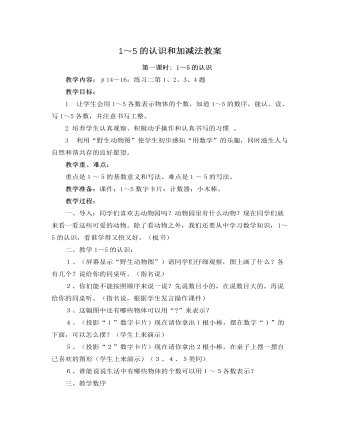
人教版新课标小学数学一年级上册1~5的认识和加减法教案
教学难点:利用数的分解组成,正确地计算5以内的减法。教学准备:小圆片、小棒、小黑板。教学过程:一、复习:1、拍手接力游戏 。2、看图说图意,并列式计算。3、复习5以内数的组成。二、新授:1、(小黑板)出示画图:树上有5只鸟,飞走了一只。根据这幅图,你能提什么问题呢?2、那么你怎么列式呢?先和小组里的小朋友说一说,再指名回答,请学生上来板书列式。3、小组内交流:“5-1”得几?你是怎么算的?和组里的小朋友交流,每个小朋友都说自己的想法,是怎样得出结果的。4、汇报情况:指名小老师上来教大家计算的过程(提倡算法多样化,教师可以有意识请想法不同的学生上来说一说)5、抽象出计算过程:引导学生如果不看图,不数手指,你会计算“5-1”得几吗?(引导学生用数的组成知识来计算)

新人教版高中英语必修3Unit 5 The Value of Money-Discovering Useful Structures导学案
4.They were going to find someone to take part in their bet when they saw Henry walking on the street outside.[归纳]1.过去将来时的基本构成和用法过去将来时由“would+动词原形”构成,主要表示从过去某一时间来看将要发生的动作(尤其用于宾语从句中),还可以表示过去的动作习惯或倾向。Jeff knew he would be tired the next day.He promised that he would not open the letter until 2 o'clock.She said that she wouldn't do that again.2.表示过去将来时的其他表达法(1)was/were going to+动词原形:该结构有两个主要用法,一是表示过去的打算,二是表示在过去看来有迹象表明将要发生某事。I thought it was going to rain.(2)was/were to+动词原形:主要表示过去按计划或安排要做的事情。She said she was to get married next month.(3)was/were about to+动词原形:表示在过去看来即将要发生的动作,由于本身已含有“即将”的意味,所以不再与表示具体的将来时间状语连用。I was about to go to bed when the phone rang.(4)was/were+现在分词:表示在过去看来即将发生的动作,通常可用于该结构中的动词是come,go,leave,arrive,begin,start,stop,close,open,die,join,borrow,buy等瞬间动词。Jack said he was leaving tomorrow.
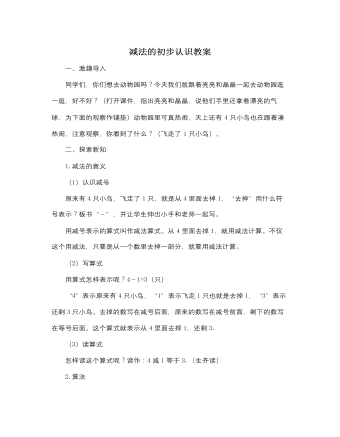
人教版新课标小学数学一年级上册减法的初步认识教案
一、激趣导入同学们,你们想去动物园吗?今天我们就跟着亮亮和晶晶一起去动物园逛一逛,好不好?(打开课件,指出亮亮和晶晶,说他们手里还拿着漂亮的气球,为下面的观察作铺垫)动物园里可真热闹,天上还有4只小鸟也在跟着凑热闹,注意观察,你看到了什么?(飞走了1只小鸟)。二、探索新知1.减法的意义(1)认识减号原来有4只小鸟,飞走了1只,就是从4里面去掉1,“去掉”用什么符号表示?板书“-”,并让学生伸出小手和老师一起写。用减号表示的算式叫作减法算式。从4里面去掉1,就用减法计算。不仅这个用减法,只要是从一个数里去掉一部分,就要用减法计算。(2)写算式用算式怎样表示呢?4-1=3(只)“4”表示原来有4只小鸟,“1”表示飞走1只也就是去掉1,“3”表示还剩3只小鸟。去掉的数写在减号后面,原来的数写在减号前面,剩下的数写在等号后面。这个算式就表示从4里面去掉1,还剩3.
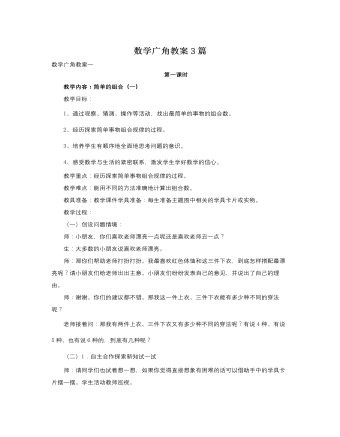
人教版新课标小学数学三年级上册数学广角教案3篇
(一)创设问题情境:师:小朋友,你们喜欢老师漂亮一点呢还是喜欢老师丑一点?生:大多数的小朋友说喜欢老师漂亮。师:那你们帮助老师打扮打扮。我最喜欢红色体恤和这三件下衣,到底怎样搭配最漂亮呢?请小朋友们给老师出出主意。小朋友们纷纷发表自己的意见,并说出了自己的理由。师:谢谢。你们的建议都不错。那我这一件上衣、三件下衣能有多少种不同的穿法呢?老师接着问:那我有两件上衣、三件下衣又有多少种不同的穿法呢?有说4种、有说5种、也有说6种的,到底有几种呢?(二)1.自主合作探索新知试一试师:请同学们也试着想一想,如果你觉得直接想象有困难的话可以借助手中的学具卡片摆一摆。学生活动教师巡视。2.发现问题学生汇报所写个数,教师根据巡视的情况重点展示几份,引导学生发现问题:有的重复了,有的漏写了。
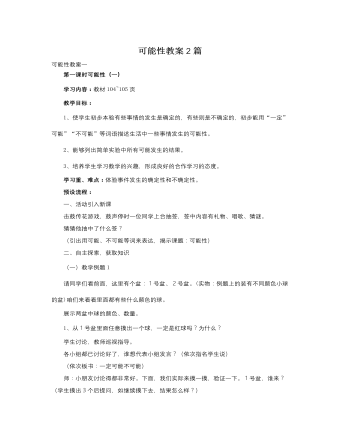
人教版新课标小学数学三年级上册可能性教案2篇
D、师:通过刚才摸球,你认为我们能摸到黄球吗?(能)一定能摸到黄球吗?(不一定)也就是说我们摸到的可能是黄球,也可能是白球。(板书:可能)3、超级竞猜:出示挂图,学生抢答。(课本105页例1)三、拓展应用1、师:在我们生活中同样有很多事情都可以用这些表示可能性的词语来表述。2、完成例2。(1)出示挂图,小组讨论。(2)组织学生汇报交流、评价,你想说哪一幅图的内容就说哪一幅。3、你还能用这些词来说说生活里的事吗?先和同桌交流,然后组织汇报、评价。4、游戏:在三叠卡片中各选一张,按排列顺序组成一句话,说一说这件事发生的可能性。5、作业:在书上完成108页第1、2题。四、总结全课1、师:今天,我们主要学习了什么内容?2、小结:生活里可能性的事情还有很多很多,有些事情一定会发生,有些事情可能会发生,有些事情不可能会发生。希望同学们做生活中的有心人,找一找生活中的可能性。
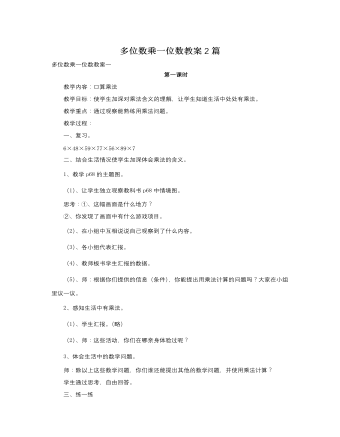
人教版新课标小学数学三年级上册多位数乘一位数教案2篇
教学内容:口算乘法教学目标:使学生加深对乘法含义的理解,让学生知道生活中处处有乘法。教学重点:通过观察能熟练用乘法问题。教学过程:一、复习。6×48×59×77×56×89×7二、结合生活情况使学生加深体会乘法的含义。1、教学p68的主题图。(1)、让学生独立观察教科书p68中情境图。思考:①、这幅画面是什么地方?②、你发现了画面中有什么游戏项目。(2)、在小组中互相说说自己观察到了什么内容。(3)、各小组代表汇报。(4)、教师板书学生汇报的数据。(5)、师:根据你们提供的信息(条件),你能提出用乘法计算的问题吗?大家在小组里议一议。2、感知生活中有乘法。(1)、学生汇报。(略)(2)、师:这些活动,你们在哪亲身体验过呢?3、体会生活中的数学问题。师:除以上这些数学问题,你们谁还能提出其他的数学问题,并使用乘法计算?学生通过思考,自由回答。
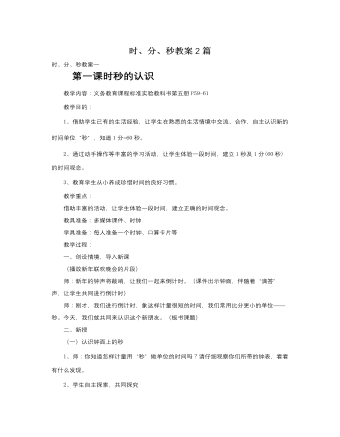
人教版新课标小学数学三年级上册时、分、秒教案2篇
教学目的:1、通过贴近学生生活实际的素材,在丰富多彩的实践活动中充分体会时、分、秒的实际意义。2、通过练习,学生比较熟练地进行一些简单的时间计算教学重、难点:时间单位的简单转换和求经过时间的方法。教学过程:第2题,先让学生独立完成,再让学生说一说每一题是怎么比较的,允许学生用不同的方法进行比较,只要说得有道理就行。第3题,读读书上的三个例子,并要求学生收集类似的信息。第4、5题,学生计算经过的时间。如果部分学生有困难,让他们借助钟面模型加以演示、理解,教师给予适当的帮助。第6题,要求学生先估计,再实际进行验证,验证的数据可以由学生和家长一起完成。第7题,事先让学生找几个自己感兴趣的节目,想办法把它们开始和结束的时刻都记录下来。
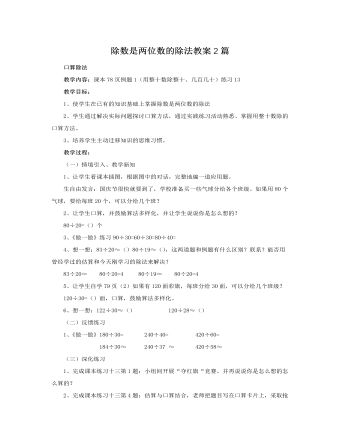
人教版新课标小学数学四年级上册除数是两位数的除法教案2篇
教学目标:1、使学生在已有的知识基础上掌握除数是两位数的除法2、学生通过解决实际问题探讨口算方法,通过实践练习活动熟悉、掌握用整十数除的口算方法。3、培养学生主动迁移知识的思维习惯。教学过程:(一)情境引入、教学新知1、让学生看课本插图,根据图中的对话,完整地编一道应用题。生自由发言:国庆节很快就要到了,学校准备买一些气球分给各个班级。如果用80个气球,要给每班20个,可以分给几个班?2、让学生口算,并鼓励算法多样化,并让学生说说你是怎么想的?80÷20=()个3、《做一做》练习90÷30=60÷30=80÷40=4、想一想:83÷20≈()80÷19≈(),这两道题和例题有什么区别?联系?能否用曾经学过的估算和今天刚学习的除法来解决?
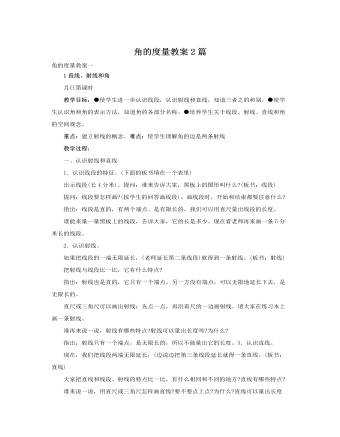
人教版新课标小学数学四年级上册角的度量教案2篇
一、认识射线和直线1.认识线段的特征。(下面的板书填在一个表里)出示线段(长4分米)。提问:谁来告诉大家,黑板上的图形叫什么?(板书:线段)提问:线段要怎样画?(按学生的回答画线段)。画线段时,开始和结束都要注意什么?指出:线段是直的,有两个端点。是有限长的,我们可以用直尺量出线段的长度。谁能来量一量黑板上的线段,告诉大家,它的长是多少。现在看老师再来画一条5分米长的线段。2.认识射线。如果把线段的一端无限延长,(老师延长第二条线段)就得到一条射线。(板书:射线)把射线与线段比一比,它有什么特点?指出:射线也是直的,它只有一个端点。另一方没有端点,可以无限地延长下去,是无限长的。直尺或三角尺可以画出射线:先点一点,再沿着尺的一边画射线。请大家在练习本上画一条射线。
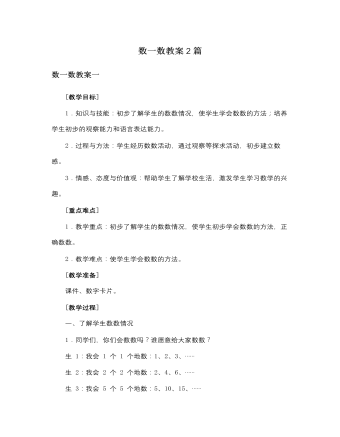
人教版新课标小学数学一年级上册数一数教案2篇
[在学生数的过程中再加强点数的指导,同时有意识的培养学生按顺序数数。另外,在数六朵花、八棵树、九名女生、十名男生的时候,除了 1 个 1 个地数以外,还可以引导学生 2 个 2 个地、3 个 3 个地、4 个 4 个地、5 个 5 个地数数,为后面学习 10 以内各数打基础。] (2)小组进行交流。 再从 1~10 数一数物体的个数。 (3)认一认。 师:你认识这些数吗?边指边读给大家听听。 生:边指 1~10 各数边读一读。 三、巩固练习 1.结合实物,开展数数活动。 (1)按要求数出下面物体的个数。 师:同学们刚才数得真不错!你们愿不愿意数一数自己文具盒中有几支铅笔呀? 生:数出自己文具盒中有几支铅笔并汇报。 师:请同学们数一数你的书包里共有几本书? 生:数出自己书包里共有几本书并汇报…… (2)自由数物体的个数。 师:你还想数哪些物体的个数?和同桌的小伙伴交流一下。
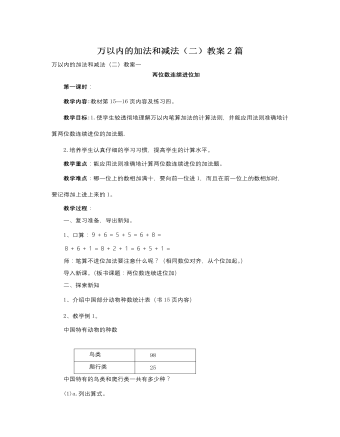
人教版新课标小学数学三年级上册万以内的加法和减法(二)教案2篇
●教学内容:教科书第27页的内容。●教学目标:①通过创设具体的情境,使学生初步学会加法的验算,并通过加法验算方法的交流、让学生体会算法的多样化。②培养学生探索合作交流的意识和能力。③让学生用所学到的验算知识去解决生活中的问题,体会用数学的乐趣。●教具准备:老师准备挂图或课件。●教学过程:创设情境、导入新课。师:同学们,你们与爸爸、妈妈去超市买过东西吗?生:互相说说,再请同学发表意见。师:(挂图1)我们来看挂图,小明和妈妈去超市买东西,从图1中你看到了什么?生1:从图1中我看到了小明妈妈买了一套135元的运动服和一双48元的运动鞋。生2:从图1中我看到小明妈妈给了售货员200元。生3:要知道一套运动服和一双运动鞋一共要多少元?应用加法计算。师:全班动手计算。板书:135+48=183(元)
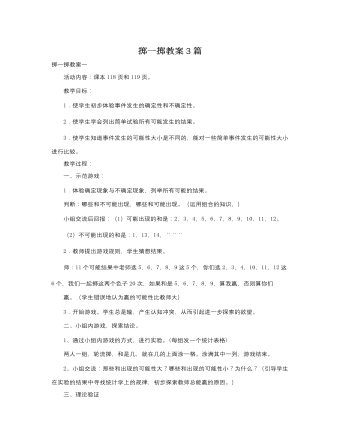
人教版新课标小学数学三年级上册掷一掷教案3篇
3、开始游戏。学生总是输,产生认知冲突,从而引起进一步探索的欲望。(二)小组内游戏,探索结论。通过小组内游戏的方式,进行实验,利用统计的方式呈现实验的结果,初步探索教师总能赢的原因。要引导学生在实验的结果中寻找统计学上的规律。(三)理论验证通过组合的理论来验证实验的结果。可以用不同的方式来进行组合,让学生探讨每个“和”所包含的组合情况的多少与这个“和”出现的次数之间的关系。三、师生共同小结本次活动1、通过本次活动,你有什么新的收获?2、师生总结:本次活动通过猜想、实验、验证等过程,让同学们在问题情境中自主探索,解决问题,既发展了同学们的动手实践能力,又充分调动了同学们的学习兴趣。

